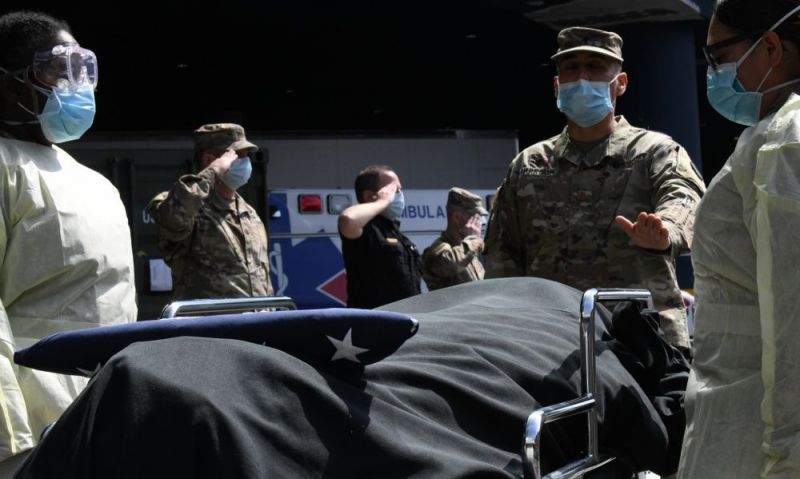
NY Legion post ensures casket flags are available to veterans dying from COVID-19
In mid-April a veteran who was being treated for COVID-19 at the Javits New York Medical Station (JNYMS) passed away. As a number of COVID-19 patients being treated at the medical station are 65 years or older, the reality set in that veterans likely will be among the casualties of the coronavirus pandemic’s impact on New York.
But because of the efforts of New York Legionnaires, those veterans who do die at the JNYMS will receive a U.S. flag for their casket, to go along with proper military honors by personnel serving in Unified Command/Incident Command Javits during the transfer of remains.
When the veteran passed away on April 19, Incident Command Sgt. Major Bob Jenks – a New York Army National Guardsman, combat veteran and a member of American Legion Post 178 in Millerton, N.Y. – prepared for the fact there would be a need to provide proper military honors before being transferred to the Office of the City Medical Examiner or funeral directors in preparation for final burial.
An honor guard was arranged for the transfer, but a casket flag was needed. Jenks reached out to former Post 178 and Duchess County, N.Y., Commander Al Andrews. Within 12 hours, 15 5’x8’ U.S. flags were delivered to JNYMS for the initial transfer of remains and any to happen going forward.
Andrews, a 47-year Legionnaire, said assisting with the flag request with an easy decision. “If it’s for the veterans, we’re pretty much doing whatever we can to help meet a need,” he said. “The support, although unique in this pandemic response, is exactly what The American Legion is intended for.”
And on April 19, with a plan developed to transfer the remains, that flag was in place as the facility’s chaplain, Army Maj. Ivan Arreguin, provided a brief service for the transfer and the casket flag was delivered with the deceased for the funeral home to pass on to family members. More than 60 servicemembers attended the transfer, as did representatives from all the civilian agencies assisting the efforts at JNYMS.
Anderson said being able to assist in one veteran’s proper final transfer, and the possibility of assisting with future such transfers, is a silver lining among the difficulty in dealing with the pandemic. The post is planning on sending at least another 30 flags to JYNMS. “It’s a real good feeling being able to help … the relatives (of the veteran)," he said. “It’s sad they’re not getting the recognition they normally would have gotten if it were better times.”
Post 178 has a long history of being active in its community, and those efforts have continued through the coronavirus pandemic. The post has an electronic sign that it uses to advertising American Legion functions, and events, as well as to honor servicemembers killed on active duty. But the post has since turned use of the sign over to Town of North East & Village of Millerton officials to share critical information with the public: social distancing reminders, what to do if exhibiting COVID-19 symptoms, testing options and other messaging.
“It’s pretty hard to get the word out to everybody, and it’s very important that people know what’s going on and how to stay healthy, and where to go and what to do,” Andrews said. “Our Legion sign, people look at that all the time and miss it when it’s not on.”
Post 178 Adjutant and Historian Sean M. Klay – an Army National Guard captain currently serving as the Operations Officer for the 53rd Digital Liaison Detachment at Camp Smith in Cortlandt Manor, N.Y. – said times like the coronavirus pandemic are an opportunity for American Legion posts to show their value to the community.
“We were told to close. We weren’t given the option,” Klay said. “But on the flip side, just because our day-to-day operations can’t necessarily take place the way we normally would like them to, it doesn’t mean we don’t have a role to fill in our community. We had (a post member) who said, ‘Hey, we have a need to make sure these (veterans) get recognized. That’s a no-brainer. That’s why we are here.
“There’s a myriad of ways posts can step up and be relevant during times of crisis. Right now this is the niche we were able to fill. That’s what makes the Legion so versatile is that we’re able to identify those needs in our respective communities and help fill those needs.”
